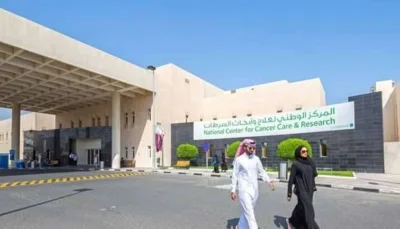Diabetes is a major healthcare challenge and priority in Qatar, with its prevalence currently at 17% ? twice the global average. Ten percent of diabetes cases are type 1 (T1D) and 90% are type 2 (T2D). A further 20% of the population have prediabetes, with a high risk of developing T2D.
A dominant driver of the development of prediabetes and T2D is being overweight and obese. Approximately 70% percent of the population of Qatar is overweight and, of this, about 40% is obese. A further concern are the vascular complications of diabetes, which can cause damage to the kidney, retina, and nerves in the arms and legs, and bring an increased risk of cardiovascular disease (CVD). The prevalence of vascular complications is 30-40% in the diabetic population.
In this section, Dr Paul J Thornalley, scientific director at the Diabetes Research Center (DRC) at Qatar Biomedical Research Institute (QBRI), discusses below the research being carried out at QBRI’s DRC, and the impact of the Covid-19 pandemic.
Emerging innovative diagnostics in diabetes research
QBRI is exploring the application of transcriptomic, proteomic, and metabolomic biomarkers for the diagnosis of patients at risk of developing diabetic kidney disease (DKD) with rapid decline in renal function. The institute is also investigating biomarkers for the diagnosis of comorbidities of diabetes, such as CVD, stroke, and dementia, and are working with teams at the College of Health and Life Sciences at HBKU, HMC, and Weill Cornell Medicine – Qatar. QBRI investigators, in collaboration with Qatar Computing Research Institute at HBKU, have also developed a risk score to screen for prediabetes.
DKD is often considered the most feared vascular complication of diabetes. Approximately one in three patients with T2D are at high risk of developing DKD, with rapid decline in kidney function leading to an eventual need for renal dialysis and kidney transplantation. It is not currently possible to identify these patients in the early-stage of the disease when drug treatment would be most effective.
So, currently, when patients with T2D develop early indications of kidney dysfunction – increased urinary albumin or microalbuminuria – all are given drugs that are renoprotective. QBRI has identified biomarkers that provide strong and conclusive evidence of which patients will develop future DKD with rapid renal function decline. The institute is working on further validation of this, which may then be used to direct drug treatment to those patients with T2D who need it most — application of precision medicine to DKD.
Advances in the application of human pluripotent stem cells in diabetes research
QBRI is studying human pluripotent stem cells to investigate the molecular mechanisms underlying the development of diabetes and to generate functional pancreatic beta cells for therapeutic use in diabetes. The institute is involved in a major research collaboration with Harvard Stem Cell Institute (HSCI), and research projects are investigating mechanisms of production of insulin producing beta cells from iPSCs, immunological responses in T1D, and beta cell dysfunction produced by a rare genetic mutation found in the Qatari population.
This five-year joint project with HSCI will make use of the unique integrated expertise at QBRI and HSCI and will enable researchers from the stem cell biology, diabetes, genomics and structural biology to collaborate and utilise diverse tools to discern the function of transcription factors expressed during pancreas development and play a critical role in -cell functionality. Clinical trials arising from agreement will be conducted with QBRI stakeholders, such as Hamad Medical Corporation and Sidra Medicine.
Covid-19 pandemic and diabetes research at QBRI
From the earliest stages of the pandemic, it emerged that people who are obese or have diabetes are at increased risk of developing severe and life-threatening symptoms of Covid-19. The causative Sars-CoV-2 virus binds to angiotensin, converting enzyme-2 to gain entry into cells. It infects lung cells, and also cells that are dysfunctional in diabetes, including those of blood vessels and kidneys. QBRI refocused efforts to study how Covid-19 impacts on diabetes and developed strategies for risk prediction diagnostics, repurposing of anticancer drugs for the treatment of Covid-19, and repurposing of a dietary supplement developed to correct insulin resistance and prevent T2D, for the prevention of decline in lung function and prophylaxis for Covid-19. These studies are ongoing.
In this section, Dr Thornalley examines the major developments in diabetes research in Qatar in 2020, important events, research progress, and the emerging role of precision medicine in the battle against diabetes during 2020.
Diabetes Leadership Forum 2020
In February 2020, Qatar’s Ministry of Public Health organised the Diabetes Leadership Forum in collaboration with the Qatar Metabolic Institute (QMI), Hamad Medical Corporation (HMC), Primary Health Care Corporation (PHCC), and the Qatar Diabetes Association. The forum reviewed progress made since the launch of Qatar’s National Diabetes Strategy 2016-2022 and discussed the Strategy Action Plan for the next two years, launching the National Agenda for Diabetes Research and CVD risk factors. The forum emphasised the importance of the national programme for prevention of T2D, which now includes an increasing role concerning early-stage remission of T2D, and also stressed the need for further research on understanding the disease mechanisms.
Landmark study on remission of type 2 diabetes by intensive lifestyle intervention
In June 2020, the outcome of the DIADEM-I study performed by investigators at QMI, HMC, and PHCC was published. The study detailed a clinical trial of patients with T2D within three years of diagnosis, comparing the effects of a low-calorie diet meal replacement followed by food reintroduction and increased physical activity to maintain weight loss, with usual medical care. The key findings were remission of T2D in 61% of participants and normoglycemia in 33% of participants in the intervention study group after 12 months.
Remission of T2D – reduction or disappearance of the symptoms of T2D – has now emerged as a key treatment option. It is associated with a decrease in fat deposition in the liver and pancreas and a lifting of hepatic insulin resistance. If remission of diabetes can be achieved and sustained in the long term for a wider group of patients with T2D, this will be a remarkable achievement and a major turning point in the treatment of diabetes.
However, there remains concern that this approach may not be effective for all patients and, furthermore, it does not correct insulin resistance in skeletal muscle – a key driver of development of T2D. Other interventions to counter this, such as pharmacological interventions with dietary supplements or drugs, may provide further support for the prevention and remission of T2D. These approaches are currently under investigation at QBRI. It is likely that a multiplicity of approaches will be required to prevent and induce remission of T2D in Qatar.
Diabetes research and emerging approaches to precision medicine
Precision medicine is a concept that involves the customisation of healthcare with decisions on treatment and care tailored to an individual person. This is based on the predicted risk of an individual to develop a disease or respond to a particular therapeutic approach.
The implementation of precision medicine requires the measurement of disease risk and treatment response indicators or “biomarkers”. Biomarkers may be genetic polymorphisms, proteins, metabolites, or other indicators. Access to clinical samples via Qatar Biobank (QBB) and genomic sequence data via the Qatar Genome Program (QGP) greatly facilitates research for the development of precision medicine. QBB and QGP have recently merged to become the Qatar Precision Medicine Institute (QPMI), which sees these efforts consolidated.
Conclusion
QBRI is looking forward to further studies in translational medicine to assist in the implementation of a precision medicine approach to the care and treatment of people at risk of developing T2D and patients with T2D at risk of developing vascular complications and co-morbidities in Qatar. DRC investigators are applying their ingenuity and skills to developing new tools aiming for risk prediction, prevention, and treatment of diabetes and Covid-19.
About Hamad Bin Khalifa University
Innovating Today, Shaping Tomorrow
Hamad Bin Khalifa University (HBKU), a member of Qatar Foundation for Education, Science, and Community Development (QF), was founded in 2010 as a research-intensive university that acts as a catalyst for transformative change in Qatar and the region while having global impact. Located in Education City, HBKU is committed to building and cultivating human capacity through an enriching academic experience, innovative ecosystem, and unique partnerships. HBKU delivers multidisciplinary undergraduate and graduate programmes through its colleges, and provides opportunities for research and scholarship through its institutes and centres. For more information about HBKU, visit www.hbku.edu.qa

Dr Paul Thornalley, scientific director at the Diabetes Research Center (DRC) at Qatar Biomedical Research Institute (QBRI).


